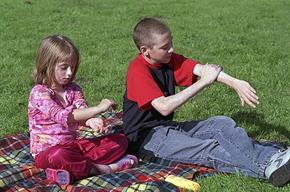
Sunburn and Heat Exhaustion

Most of us enjoy spending time in the sun and but sometimes we can overdo exposure to the sun’s rays. It’s easy to underestimate your time to the sun and not realise you’re getting burnt.
Sunburn
While sunburn is usually short-lived, it's important to avoid because it can increase the chances of developing skin cancer in later life. Below are some tips on how to treat mild sunburn:
- The first thing to do if you or your child has sunburn, is to get out of direct sunlight as soon as possible
- Cool skin by sponging with cool water or have a cool bath or shower – applying a cold compress to the affected area may also help
- Drink plenty of fluids to bring temperature down and prevent dehydration
- Apply a water-based cream, emollient or petroleum jelly (such as Vaseline) to keep skin cool and moist
- If necessary, take painkillers such as ibuprofen or paracetamol
- Try to avoid all sunlight, including through windows, by covering up the affected areas of skin until your skin has fully healed
You should contact your GP or call NHS 111 for advice if:
- The sunburn is over a large area
- There is blistering or swelling of the skin
- You have chills or a high temperature of 38C or above, or 37.5C or above in children under five.
- There are symptoms of dizziness, headaches and feeling sick (possible heat exhaustion).
Heat Exhaustion and Heatstroke
-
Heat Exhaustion
Heat exhaustion causes extreme tiredness as a result of a decrease in blood pressure and blood volume. It's caused by a loss of body fluids after being exposed to heat for a prolonged period of time.
Someone with heat exhaustion will feel sick, faint and sweat heavily. They should go immediately to a cool place and drink plenty of water. Remove excess clothing and you should start to feel better within half an hour with no long-term complications.
-
Heatstroke
Heatstroke is a more serious condition than heat exhaustion and occurs when the body's temperature becomes dangerously high. The body is no longer able to cool itself and starts to overheat.
Groups more at risk of developing heatstroke are:
- children under two
- very elderly people
- people with kidney, heart or circulation problems
- people with diabetes
Signs of heatstroke include dry skin, vertigo, confusion, headache, thirst, nausea, rapid shallow breathing (hyperventilation) and muscle cramps.
Suspected heatstroke should always be regarded as an emergency, and you should dial 999 to request an ambulance.
While waiting for the ambulance you should:
- immediately move the person to a cool area
- increase ventilation by opening windows or using a fan
- give water to drink (if the person is conscious), but don't give them medication such as aspirin or paracetamol
- shower skin with cool, but not cold, water (15-18°C); alternatively, cover their body with cool, damp towels or sheets
Left untreated, heatstroke can lead to complications, such as brain damage and organ failure. It's also possible to die from heatstroke.
There are steps you can take to reduce the risk of getting heat exhaustion and heatstroke:
- stay out of hot sun, particularly between 11am and 3pm
- walk in the shade, apply sunscreen and wear a hat
- avoid extreme physical exertion
- have plenty of cold drinks, but avoid caffeine and alcohol
- eat cold foods, particularly salads and fruit with a high water content
- take a cool shower, bath or body wash
- sprinkle water over your skin or clothing, or keep a damp cloth on the back of your neck


 Translate this page
Translate this page